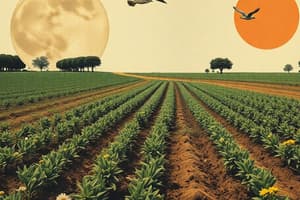Podcast
Questions and Answers
What is the primary focus of crop science in agronomy?
What is the primary focus of crop science in agronomy?
- Plant genetics, breeding, and physiology (correct)
- Integrated Pest Management strategies
- Sustainable agricultural practices
- Soil conservation techniques
Which technique is primarily aimed at reducing soil erosion and improving soil structure?
Which technique is primarily aimed at reducing soil erosion and improving soil structure?
- Precision agriculture
- Conservation tillage (correct)
- Irrigation management
- Organic farming
What does agricultural ecology primarily study?
What does agricultural ecology primarily study?
- Soil properties and processes
- Crop rotation techniques
- Interactions between agricultural systems and the environment (correct)
- Integrated Pest Management practices
Which of the following is considered a sustainable farming practice?
Which of the following is considered a sustainable farming practice?
Which current challenge in agronomy is related to climate factors?
Which current challenge in agronomy is related to climate factors?
Flashcards are hidden until you start studying
Study Notes
Definition
- Agronomy is the science and practice of soil management and crop production.
Key Areas of Study
-
Crop Science
- Study of plant genetics, breeding, and physiology.
- Focus on enhancing yield, quality, and resistance to pests and diseases.
-
Soil Science
- Analysis of soil properties and processes.
- Importance of soil fertility, conservation, and management practices.
-
Agricultural Ecology
- Interactions between agricultural systems and the environment.
- Sustainable practices to minimize ecological impact.
-
Crop Rotation and Diversification
- Techniques to improve soil health and reduce pests.
- Use of varied crops to enhance biodiversity.
-
Pest Management
- Integrated Pest Management (IPM) strategies.
- Importance of biological control, chemical applications, and cultural practices.
Techniques and Practices
-
Conservation Tillage
- Reduces soil erosion and improves soil structure.
-
Precision Agriculture
- Use of technology (GPS, sensors) to optimize field-level management.
-
Irrigation Management
- Efficient water use strategies to ensure crop health.
-
Organic Farming
- Practices that avoid synthetic chemicals and focus on natural processes.
Sustainable Agriculture
- Focus on practices that maintain productivity while preserving the environment.
- Incorporates renewable resources and minimizes waste.
Economic Aspects
- Importance of agronomy in food security and sustainability.
- Impact on agricultural policies, market trends, and farm profitability.
Career Opportunities
- Roles in research, extension services, agricultural consulting, and education.
- Opportunities in private industry, government, and non-profit organizations.
Current Challenges
- Climate change and its impact on crop production.
- Soil degradation and nutrient depletion.
- Global food demand and resource scarcity.
Definition
- Agronomy encompasses soil management and crop production as both a science and practical application.
Key Areas of Study
-
Crop Science
- Involves plant genetics, breeding, and physiology to boost crop yield, quality, and resistance against pests and diseases.
-
Soil Science
- Focuses on understanding soil properties and processes crucial for fertility, conservation, and sustainable management methods.
-
Agricultural Ecology
- Examines the relationships between agriculture and the environment, emphasizing sustainable practices to lessen ecological damage.
-
Crop Rotation and Diversification
- Implements strategies to enhance soil health and pest reduction through diverse cropping systems, thereby promoting biodiversity.
-
Pest Management
- Employs Integrated Pest Management (IPM) combining biological control, chemical methods, and cultural practices for effective pest control.
Techniques and Practices
-
Conservation Tillage
- Method that mitigates soil erosion and enhances soil structure for better crop growth.
-
Precision Agriculture
- Utilizes technology such as GPS and sensors to refine management at the field level, promoting efficiency and yield.
-
Irrigation Management
- Strategies designed to maximize water efficiency, crucial for maintaining crop health.
-
Organic Farming
- Focuses on farming practices avoiding synthetic chemicals, instead relying on natural processes and inputs.
Sustainable Agriculture
- Prioritizes methods that sustain agricultural productivity while safeguarding the environment, leveraging renewable resources and minimizing waste.
Economic Aspects
- Plays a pivotal role in ensuring food security and sustainability, affecting agricultural policies, market dynamics, and farm profitability.
Career Opportunities
- Diverse prospects include research, extension services, consulting, and education within private sectors, government, and NGOs.
Current Challenges
- Major obstacles include climate change affecting crop yields, soil degradation, nutrient depletion, and escalating global food demand amidst limited resources.
Studying That Suits You
Use AI to generate personalized quizzes and flashcards to suit your learning preferences.




